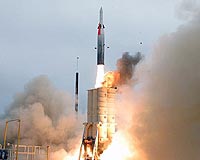| . |  |
. |
Tehran (AFP) Oct 26, 2009 Iran said on Monday it could ship out some of its low-enriched uranium to be upgraded abroad or buy the fuel directly, as a UN team ended its inspection of a newly revealed atomic plant. Foreign Minister Manouchehr Mottaki said Iran was mulling the UN-brokered deal which envisages sending Tehran's low-enriched uranium (LEU) abroad to be converted into nuclear fuel, and would announce a decision within days. "For the supply of (nuclear) fuel, we may buy it like in the past or we may deliver a part of our (low-enriched uranium) fuel that we don't need now," Mottaki told the official IRNA news agency, indicating for the first time that Tehran could possibly agree to the UN-drafted deal. "Both options are on the table." Mottaki is also the most senior official to talk about buying the fuel directly from a foreign supplier since the UN atomic watchdog-brokered deal was suggested earlier last week. The UN-brokered deal was proposed first by world powers through the International Atomic Energy Agency (IAEA), Mottaki said. President Mahmoud Ahmadinejad also suggested this arrangement a day before October 1 high-profile talks in Geneva between six world powers and Tehran about Western concerns over Iran's nuclear programme. Western powers back the UN-brokered deal and are keen that Iran's LEU be taken out of the country as they suspect Tehran would process it further on its own to higher purity levels and use it to make atomic weapons. Tehran denies the charge. France has said the deal aims to transport 1,200 kilos of Iranian LEU to Moscow to be converted. The Islamic republic is estimated to have 1,500 kilos of LEU at its enrichment plant in the central city of Natanz. But the UN-led offer has met with tough opposition from some top officials who suspect Western powers of creating obstacles for Iran's uranium enrichment drive, which they ultimately want suspended. Enrichment of uranium is the most controversial aspect of Tehran's nuclear programme since it can be used both to generate electricity -- as Tehran says it is doing -- or to make the fissile core of an atom bomb. "Making a decision to choose which option is on the agenda of the Islamic republic, and in the next few days the decision will be announced," Mottaki said. Meanwhile, Alaeddin Borujerdi who heads parliament's national security and foreign policy committee, told ISNA news agency that the four-member team of UN experts on Monday ended its inspection of a controversial second uranium enrichment plant. "They ended their job," the MP said without elaborating. A source close to Iran's atomic body also told AFP the inspection had ended and the team "will leave tonight." The plant is being built inside a mountain near the Shiite holy city of Qom, south of Tehran. It is adjacent to a military base and heavily guarded against any air strike by arch-foes the United States or Israel. The inspectors checked the site to verify whether it was designed for peaceful nuclear purposes, as its disclosure on September 21 fuelled fresh concerns in the West on Tehran's uranium enrichment drive. Borujerdi has been critical of the UN-brokered deal, but said in remarks published on Monday that Iran should give its LEU "in a gradual way" as it would ensure Tehran's right to enrich uranium. Turkish Prime Minister Recep Tayyip Erdogan, who arrived in Tehran late on Monday, downplayed Western concerns that Iran wants to build nuclear weapons as "gossip," The Guardian newspaper reported. "So although Iran doesn't have a weapon, those who say Iran shouldn't have them are those countries which do," he said in an interview. He also said a military strike against Iranian nuclear installations would be "crazy." During his visit, Erdogan is due to meet senior Iranians including supreme leader Ayatollah Ali Khamenei, Ahmadinejad, parliamentary speaker Ali Larijani and Mottaki. US State Department spokesman Ian Kelly said representatives from the the P5-plus-one countries -- the five permanent members of the UN Security Council plus Germany -- spoke by telephone on Monday about the need to maintain united pressure on Iran as Tehran weighs the UN-brokered deal. aet-fpn-sgh-jds/anw Share This Article With Planet Earth
Related Links Learn about nuclear weapons doctrine and defense at SpaceWar.com Learn about missile defense at SpaceWar.com All about missiles at SpaceWar.com Learn about the Superpowers of the 21st Century at SpaceWar.com
 Israel too 'weak' to attack Iran nuclear sites: Mottaki
Israel too 'weak' to attack Iran nuclear sites: MottakiTehran (AFP) Oct 26, 2009 Iran's Foreign Minister Manouchehr Mottaki said on Monday that arch-foe Israel was too weak to carry out any attack on Tehran's nuclear sites. Mottaki's remarks reported by Mehr news agency came as a team of UN inspectors were conducting checks on Tehran's recently-revealed second uranium enrichment plant. Last month's disclosure of the facility which is being built near the Shiite holy ... read more |
|
| The content herein, unless otherwise known to be public domain, are Copyright 1995-2009 - SpaceDaily. AFP and UPI Wire Stories are copyright Agence France-Presse and United Press International. ESA Portal Reports are copyright European Space Agency. All NASA sourced material is public domain. Additional copyrights may apply in whole or part to other bona fide parties. Advertising does not imply endorsement,agreement or approval of any opinions, statements or information provided by SpaceDaily on any Web page published or hosted by SpaceDaily. Privacy Statement |